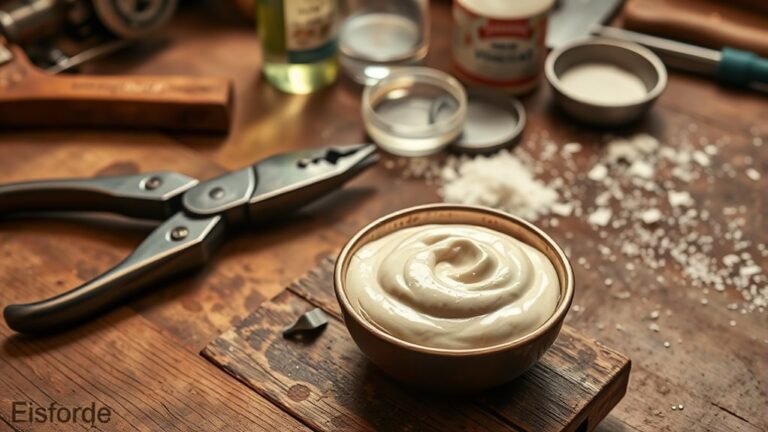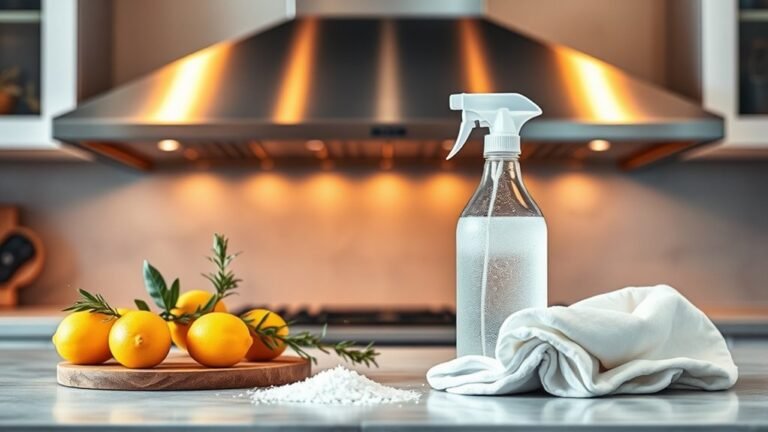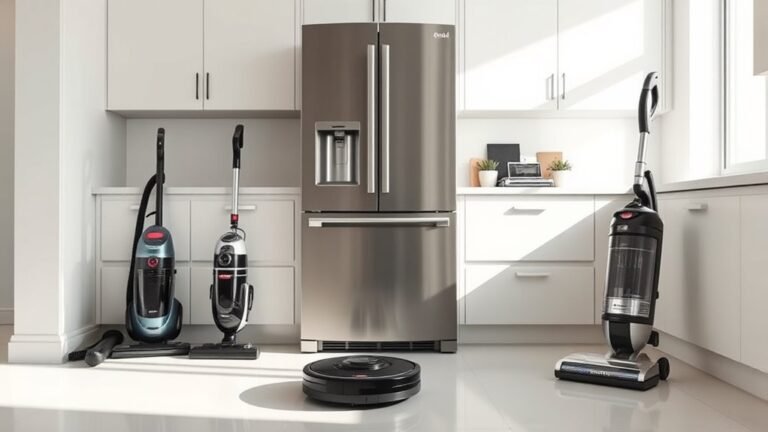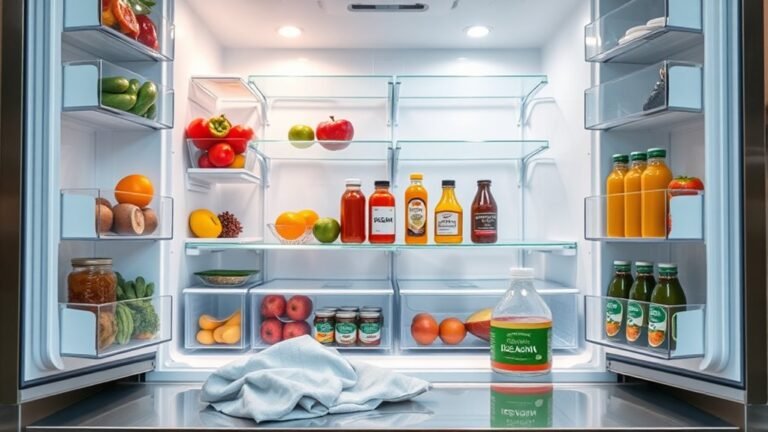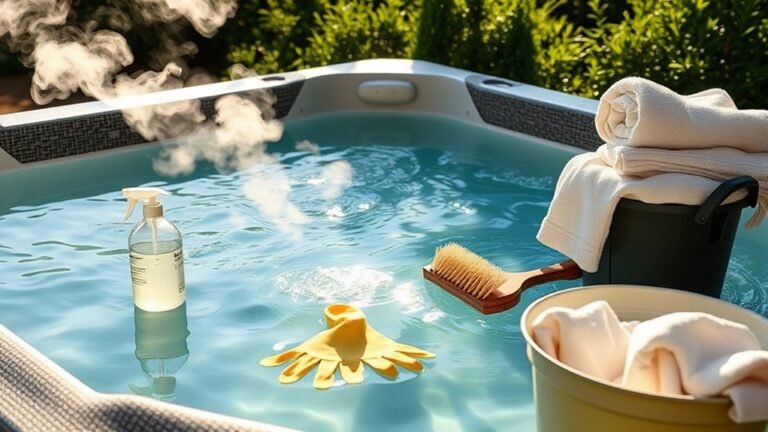Budget-Friendly DIY Cleaning Products for Coffee Machine
You can keep your coffee machine clean without spending much by using simple DIY cleaners like a 1:1 mix of white vinegar and water to dissolve mineral buildup and coffee oils. For stubborn stains, a baking soda paste works wonders. Citrus peel infused vinegar adds a fresh scent while cleaning. Regularly cleaning parts with mild soap and following maintenance tips helps your machine last longer and brew better. Keep going to discover easy, budget-friendly ways to care for your coffee maker.
Essential Ingredients for DIY Coffee Machine Cleaners

Although commercial cleaners are available, you can easily make effective coffee machine cleaners at home using a few essential ingredients. When you choose homemade cleaners, you’re embracing natural alternatives that save money and reduce exposure to harsh chemicals. Simple staples like baking soda and citric acid are your best friends—they’re gentle yet powerful at breaking down coffee oils and mineral buildup. You can also use mild dish soap for routine cleaning without damaging your machine. These ingredients are not only affordable but also easy to find in your pantry, giving you the freedom to maintain your coffee maker on your own terms. By opting for natural alternatives, you take control of what touches your machine, ensuring a clean cup every time while supporting a healthier lifestyle.
How to Make a Vinegar-Based Cleaning Solution
If you’ve gathered your basic ingredients like baking soda and citric acid, vinegar is another powerful option you can easily add to your cleaning routine. Vinegar benefits include its natural acidity, which breaks down mineral buildup and coffee oils without harsh chemicals. To make your vinegar-based cleaning solution, mix white vinegar and water in a 1:1 cleaning ratio for effective descaling and sanitizing. This balance guarantees it’s strong enough to clean but gentle enough to protect your machine’s components. Simply pour the solution into your coffee maker’s water reservoir, run a brew cycle halfway, pause for 30 minutes, then complete the cycle. Rinse thoroughly afterward with fresh water to remove any vinegar taste. This method offers freedom from costly cleaners while keeping your coffee machine fresh and efficient.
Baking Soda Paste for Tough Stains and Residue

When you’re dealing with stubborn stains and leftover residue inside your coffee machine, a baking soda paste can be a simple yet effective solution. Thanks to baking soda benefits like gentle abrasiveness and natural deodorizing, this paste tackles stain removal without harsh chemicals. Here’s how you can make and use it:
- Mix baking soda with a small amount of water to form a thick paste.
- Apply the paste to stained areas inside your machine using a soft cloth or brush.
- Let it sit for 10-15 minutes to break down tough residue.
- Rinse thoroughly with warm water to remove all traces of the paste.
This method gives you freedom from expensive cleaners while keeping your coffee machine spotless and fresh.
Citrus Peel Infused Cleaner for Freshness and Shine
Since you’re aiming for a natural way to keep your coffee machine fresh and shiny, a citrus peel infused cleaner is a great choice. You’ll harness the citrus benefits, like its natural deodorizer properties and gentle acidity, to break down oils and coffee residues without harsh chemicals. Simply soak orange, lemon, or grapefruit peels in white vinegar for about two weeks, then strain the liquid into a spray bottle. When it’s cleaning time, spray the solution on your machine’s surfaces, let it sit briefly, and wipe away with a soft cloth. This DIY cleaner not only brightens your coffee machine but also leaves behind a subtle, invigorating scent. It’s an easy, budget-friendly way to enjoy the freedom of maintaining your equipment naturally and effectively.
Tips for Regular Maintenance and Cleaning Frequency

Although regular maintenance might seem like a hassle, keeping your coffee machine clean guarantees better taste and longer lifespan. Sticking to a cleaning schedule frees you from unexpected breakdowns and keeps your brew delicious. Here are four essential maintenance tips to simplify your routine:
- Clean the removable parts weekly with warm, soapy water to avoid buildup.
- Descale your machine monthly using a DIY vinegar solution to prevent mineral deposits.
- Wipe down the exterior daily to keep it looking fresh and grease-free.
- Replace water filters every two to three months to maintain water purity.
Frequently Asked Questions
Can I Use Lemon Juice Instead of Vinegar for Cleaning?
Imagine your coffee machine as a canvas, craving a new splash of clarity. You can definitely use lemon juice instead of vinegar; its natural acids are like tiny warriors breaking down mineral buildup. Lemon juice benefits include a pleasant citrus scent and gentle cleaning effectiveness, freeing you from harsh chemicals. Just remember, while it’s great for light cleaning, vinegar might tackle tougher grime better. Choose lemon juice for a revitalizing, freedom-loving clean!
Are These DIY Cleaners Safe for All Coffee Machine Types?
You’ll want to contemplate safety concerns and machine compatibility before using any DIY cleaner. Not all coffee machines handle acidic or abrasive ingredients well, so it’s best to check your model’s manual first. Some materials can damage seals or internal parts, so you shouldn’t assume every cleaner is safe for all types. When in doubt, stick to gentle options and test small amounts to keep your machine running smoothly and maintain your freedom to brew worry-free.
How Often Should I Descale My Coffee Machine With Homemade Solutions?
Did you know minerals can build up to 20% inside your machine over time? Frequency recommendations suggest descaling every 1-3 months, depending on water hardness and usage. Using homemade descaling methods like vinegar or citric acid keeps things natural and effective. You’ve got the freedom to choose what works best for your routine, ensuring your coffee tastes fresh while extending your machine’s life without relying on commercial products.
Can I Store Homemade Cleaning Solutions for Later Use?
You can store homemade cleaning solutions for later use, but keep in mind their solution lifespan. For best results, use airtight containers and keep them in a cool, dark place—these storage tips help maintain effectiveness. However, some solutions, especially those with vinegar or baking soda, may lose potency after a week or two. So, it’s best to make small batches to enjoy maximum freshness and freedom without worrying about expired cleaners.
What Should I Avoid When Using DIY Cleaners on Coffee Machines?
Oh, you definitely want to avoid turning your coffee machine into a science experiment gone wrong. Steer clear of harsh chemicals—they might clean well but can damage your beloved brew buddy. Abrasive materials? Nope, they’ll scratch surfaces and ruin that sleek finish you love. Since you value freedom in your routine, stick to gentle, natural cleaners that respect your machine and your taste buds. Your coffee deserves the best, after all!

